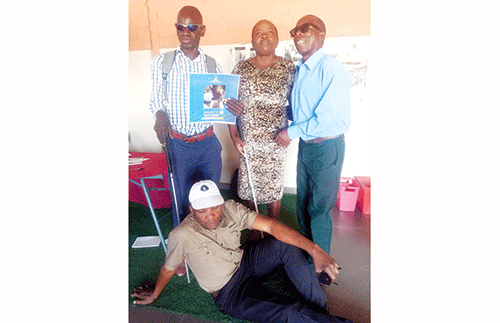KATIMA MULILO - Lack of job and educational opportunities on top of a shortage of capital to start businesses, are some of the serious impediments the visually impaired people in the Zambezi region grapple with daily.
They feel it’s high time they too get the recognition they deserve as Namibians.
Chrispin Matanyambe is one such advocate who continues to fight for the rights of people with disabilities.
“We are really left out. It is now 32 years that we are singing the same song, ‘We are left behind’. We are left behind in education, jobs and projects,” he lamented.
With people with disabilities making up an estimated 10% of the Namibian population and with 90% of them unemployed, Matanyambe, therefore, questioned when are those with disabilities going to be employed and become independent, as they are a burden to their families and relatives.
“When are we going to work? When are we going to own houses? We are still ticks. A tick doesn’t know when is the owner going to inject the cattle and it will die. We are still dependent on our families like ticks. We don’t have voices,” he stated.
Furthermore, he said there is no outreach programmes in the region aimed to educate the visually impaired and other people with disabilities who face similar challenges in their lives.
Matanyambe said if they could reach out to many
other people with disabilities, then updated statistics will also be available which could help policymakers plan. “We need a good Samaritan who can assist us with transport so we can do outreach activities for people living with disabilities. We have people with disabilities at Impalila who do not have national documents. So, they are left out in terms of social grants. We really want to help them as they are suffering,” he pleaded.
Namakaliza Sipapela, who is the regional coordinator for the Eastern Association of the Visually Impaired in Zambezi, shared similar sentiments, saying people with disabilities are sidelined when it comes to employment opportunities.
“We are trying to show our leaders and parents what we are doing at the association. We are able to go to school. We encourage our colleagues to go back to school if they can. We provide adult literacy on how to use braille. We don’t have a centre to keep them. They come and go back home,” she noted.
Sipapela, who is also visually impaired, said people with disabilities are facing challenges as relatives misuse their N$1 300 monthly social grant instead of using it to buy food and clothing for them.
Therefore, she stressed the need for more educational awareness to communities on how to tackle some of these challenges.
Sipapela noted that the health ministry printed booklets on Covid-19 regulations and health protocols in braille but the office is unable to distribute the information due to lack of transport.
“We really call on good Samaritans to help us. We also call on our parents, friends, brothers, and sisters not to hide people with disabilities in their homes but see where they can seek assistance,” she advised.
With regard to school attendance, the 2011 National Census shows that the proportion of persons aged five years and above that never attended school has decreased from 30.4% in 2001 to 28.9% in 2011.
However, the proportion of persons with disabilities without any formal education was higher in rural areas (82.3%) than in urban areas (17.7%).
It was recommended then that the situation calls for interventions to address the issue of uneducated persons with disabilities in rural areas.
The census also revealed that the highest proportion of disabled persons with no formal education were blind and visually impaired.
The highest proportion of females that were disabled are visually impaired, while for males, physical impairment of lower limbs was the common disability. Eastern Association of the Visually Impaired has about 212 members.
Kisco Milinga expressed that people living with disabilities are sidelined when it comes to job opportunities.
“We are encouraged to apply and send our applications as a first priority but when it comes to recruitment, they put us aside. We use to apply in government ministries but our applications used to be sidelined. We also need to be included in the government ministries. We are educated, we went to school. We can interpret, write and read fluently. We feel left out,” he alleged.
He said the government needs to do more to incorporate people living with disabilities into the mainstream economy through job opportunities.
The government has made a commitment by passing an Act of Parliament, the National Disability Council Act, 2004 (No. 26 of 2004), to improve the quality of life through enhancing dignity, well-being, and empowerment of persons with disabilities.
- anakale@nepc.com.na


